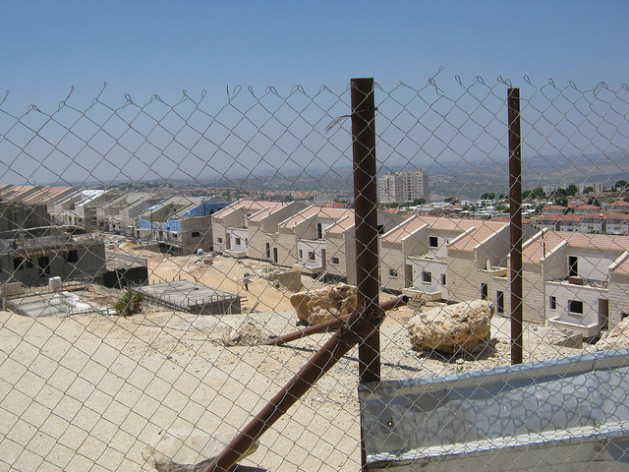by Mitchell Plitnick
Some days, it must be really difficult to be the State Department’s spokesperson. It doesn’t seem like a bad job to have at all, but on certain questions it’s impossible to not look like an idiot. A lot of those questions are connected to de facto policies which differ from de jure ones. And there is no better example of that than US policy on Israeli settlements.
Back in the early years after the 1967 war, the United States made it clear that the settlements were illegal according to international law. As recently as 1978, the State Department legal adviser confirmed that all Israeli settlements beyond the Green Line are illegal, and through the Carter administration, this was explicit US policy. That policy has never been explicitly revoked, but beginning with the Reagan administration, de facto policy has been ambiguous. Reagan began the trend when he stated that while the settlements were ill-advised, provocative and that further settlement was not necessary for Israel’s security “I disagreed when, the previous Administration refereed to them as illegal, they’re not illegal. Not under the U.N. resolution that leaves the West Bank open to all people—Arab and Israeli alike, Christian alike.”
The problematic nature of Reagan’s statement — implying that “Arab” equals “Muslim” and “Israeli” equals “Jew”, and more importantly, citing the “U.N. Resolution”, which is not the basis for the illegality of the settlements (the Fourth Geneva Convention is) — notwithstanding, this was the beginning of the US’ refusal to label settlements illegal, terming them instead, at most, “illegitimate.”
The problem for spokespeople arises when they have to parse what that means. Last Monday, in Colombia, Secretary of State John Kerry made what turned out to be an interesting statement. “As the world, I hope, knows, the United States of America views all the settlements as illegitimate,” Kerry said. The use of the word “all” might have worked in Reagan’s day, even in Bill Clinton’s. But today, when the US has allowed Israel to assert that certain settlements are essentially guaranteed (the so-called “settlement blocs” of Gush Etzion, Ariel and Ma’ale Adumim) that little word carries heavy implications.
Israel insists that it’s okay to build in the settlement blocs and the Palestinians should have no problem with that because they’re going to keep them anyway. Israel bases its case on the fact that they have repeatedly stated this publicly without being contradicted and on George W. Bush’s letter to Ariel Sharon in 2004. While that letter did not explicitly state that Israel should keep the blocs, it profoundly altered the diplomatic landscape by promising that the borders between Israel and the envisioned Palestinian state would not be the same as those that existed in 1967 and that alterations would reflect the changed demographics in those, at that time, 37 years. Israel took that to mean it would keep the blocs, and no one, other than some Palestinians (and not the lead spokespeople at the time) said otherwise.
So, when Kerry said all the settlements were illegitimate, it prompted AP reporter Matthew Lee to enter into the following exchange with spokeswoman Jen Psaki:
QUESTION: He said the United States doesn’t see all of the settlement activity as legitimate. Is it correct that – is that correct, that all settlement activity is illegitimate? And I don’t want to get into this illegitimate or illegal, because as far as I’m concerned it’s a distinction without a difference. Does the United States believe that all Israeli settlement activity along – and we can include in that East Jerusalem construction – is all of it illegitimate?
MS. PSAKI: Well, our position on Jerusalem has been clear and has been consistent for some time, which is that we believe it is a final status issue in terms of the discussion of that – of Jerusalem, right?
QUESTION: Mm-hmm.
MS. PSAKI: That is part of the discussion. We have, of course, expressed concerns about construction in East Jerusalem. That hasn’t changed. Our position on settlements we have stated a number of times, and I just stated, and that has not changed either.
QUESTION: Okay. So you do not regard the construction in East Jerusalem as illegitimate. Is that correct?
MS. PSAKI: Well, I think I just stated what we – what our longstanding position has been on construction.
…
QUESTION: But it’s not – hold on, Said. But it’s not that it’s illegitimate?
MS. PSAKI: I don’t have anything more than what I just stated.
QUESTION: Because it is a final status issue?
MS. PSAKI: It is a final status issue that we discussed and worked through.
QUESTION: So one of the questions – okay. So one of the questions that I had that Marie said she would take yesterday —
MS. PSAKI: Mm-hmm.
QUESTION: — was about the 900 homes that were announced for construction in East Jerusalem. Is it fair to say you do not regard those as illegitimate?
MS. PSAKI: Well, we – in terms of those specific – that specific announcement —
QUESTION: Right.
MS. PSAKI: — you know we oppose any unilateral action. Certainly we would include this, that attempt to prejudge final status issues, including the status of Jerusalem. That’s where that building is taking place. That’s our view on it.
QUESTION: Okay. So you’re opposed to it, but you don’t say that it’s illegitimate?
MS. PSAKI: I think you know our position.
QUESTION: Okay. So in terms of illegitimacy then, this legitimacy issue, are existing settlements illegitimate in the eyes of the Administration in the West Bank? Settlements in the West Bank that currently exist now, are they illegitimate, meaning that they should not be part of Israel once there is a peace agreement?
MS. PSAKI: Well, obviously, the question of borders will be worked through and is part of the discussion that will take place and will be ongoing in the weeks and months ahead.
QUESTION: So are existing settlements illegitimate?
MS. PSAKI: Well, we have concerns about ongoing continued settlement activity.
QUESTION: Okay. Do you understand that there’s a serious problem here? Because if you talk about – if all you’re prepared to say is that you don’t accept the legitimacy of continued settlement activity, you are only calling illegitimate settlements that have not been announced, settlements that are, say, a twinkle in the Housing Minister or whoever’s eye. Once they are actually announced or built, you stop calling them illegitimate, and they – and you start saying that that’s a – that’s something to be decided between the parties. Okay?
MS. PSAKI: Well, this has been our position for a number of years.
QUESTION: That’s – well, right. But —
MS. PSAKI: So —
QUESTION: And I’m surprised that no one, and especially me, has picked up on this before, because you have essentially – you don’t oppose settlements at all, because once they’re built or once they’re announced, once plans for them – plans to build them are announced, you’re not opposed to them anymore, because it’s something for the parties to decide whether they’re legitimate or not.
MS. PSAKI: Well, certainly it will be – a big part of the discussion will be that process moving forward.
QUESTION: Right. Do you understand the problem? Do you understand the —
MS. PSAKI: I understand what you’re conveying, Matt. I’m happy to talk back with our team and see if there’s any more clarification we can provide.
QUESTION: Okay. So tell me, am I wrong in thinking that the United States has no position at all except that it is to be decided by the parties on the legitimacy or illegitimacy of settlements that exist in the West Bank today?
MS. PSAKI: I believe you are wrong, Matt. We’ll get you some more clarification.
QUESTION: You believe I’m wrong? Okay.
MS. PSAKI: We’ll get you some more clarification.
QUESTION: Jen —
MS. PSAKI: Mm-hmm.
QUESTION: — in fact, your longstanding position, going back all the way to 1967, and through George Herbert Walker Bush when he was representative at the United Nations, and on to Andrew Young, and on and on and on, that the settlement, that Jerusalem – East Jerusalem, the West Bank, all territory occupied is contrary to the Fourth Geneva Convention, and any alteration stands contrary to that, that you will not support. That is your position, not to reconcile yourself to the facts on the ground, as has been suggested.
Earlier, Lee said to Psaki “Back in 1978, President Carter said that, quote, ‘We don’t see these settlements as being legal.’ Why can’t you say that they aren’t legal?” Psaki, of course, had no answer.
Ultimately, the only people making the argument that the settlements are legal are the Israelis and a handful of apologists who try to bend and twist international law into an interpretation that fits their needs. Otherwise, there is virtually universal agreement that all settlements beyond the Green Line are illegal. Technically, that is also the US position, since there has never been any official statement from a government representative charged with understanding and interpreting international law to reverse the conclusion reached in 1978. But in reality, the political upheaval that would ensue from re-stating that position makes it impossible to do so.
This was made even more interesting when, on August 12, the Washington Post’s internet edition apparently misquoted Kerry saying that the settlements were illegal, rather than illegitimate. When I saw the original version I almost fell over. Had that occurred, it would have been a major game-changer. Quickly, however, the Post corrected the error. I’m sure it was, indeed, an error, because I cannot imagine Kerry actually saying that.
Yes, I cannot imagine the US’ Secretary of State stating what remains the official legal interpretation as set forth by the State Department’s legal adviser and which, outside the US and Israel, is nearly an absolute consensus view. Interestingly, even the most pro-Israel of Presidents, be it Reagan, George W. Bush, Bill Clinton or Barack Obama, has seen the settlements as a serious problem. They would all have liked to see Israel put a halt to them. But when George H.W. Bush, who, during his time as Ambassador to the UN, explicitly stated the settlements were illegal, acted during his presidency to slow them, he was called anti-Israel. And we can all recall what happened when Obama asked Benjamin Netanyahu to freeze settlements so peace talks could continue (and, no, despite Bibi’s statements, the freeze never really happened — as Lara Friedman of Americans for Peace Now explains here).
These are the results of a schizophrenic policy, where the policy as enacted nearly opposes official statements of it. Good luck to Jen Psaki trying to explain it.
Photo: A new neighbourhood under construction in the West Bank’s Ariel settlement. Credit: Pierre Klochendler/IPS






So, now it’s ‘official’, the U.S. position is that none of the settlements, old, new or planned are illegal or not until a final status agreement is signed. ‘So, pal, if you don’t sign now, you risk losing everything’. It’s worse than a shell game, it’s a positive endorsement of more expropriations and ethnic cleansing- the ‘much improved’ version of the Sharon plan “Eating Palestine for Breakfast” (see http://www.haaretz.com/news/eating-palestine-for-breakfast-1.61792) since there are many more settlements deeply in place that will be ‘impossible’ to dislodge, but then again, there was never an intention not to annex everything over time if it were possible, or to use the failure of a final status agreement and interminable negotiations, breakdowns as an excuse for doing so. Look, would Bibi be honoring his father or Jabotinsky or his imperial mandate if he did otherwise? Anyway, it already is de facto a single state. Now the task will be to ensure that it will always be a “Jewish State”, which means an exclusionary one (after all the riff raff who worship the wrong way aren’t allowed the same rights as it is), rather than a multiethnic democratic one.
What is to stop Israel from doing the same thing to Jordan, Syria, even Lebanon? Greed and bullying seems to be what drives the Israelis. They have gotten away with it thus far, IMHO, will continue until the M.E. suffers from the over arrogance of one or more of the parties, probably using WMDs on each other, but I doubt that Iran will be in the forefront when it happens. Israel isn’t invincible, though it believes it is. As usual, it will be the general population who suffers the brunt of any destructiveness, the leadership either deep in their bunkers or just plain disappeared from country, the latter being the case, along with the financial stash in out of reach bank accounts from the government.
The International Court of Justice has given an Advisory Opinion on this issue. They say “the Israeli settlements in the Occupied Palestinian Territories (including East Jerusalem) have been established
in breach of international law”. Do not be mislead by the words Advisory and Opinion. The ICJ is the highest authority there is on international law. Its Opinions are definitive. There is no need to depend on the State Department’s legal advisor, because the ICJ outranks him.
It is best if everyone sticks to the Court’s terminology, rather than talking about the settlements being illegal or illegitimate, which tends to give the impression that the people building or living in the settlements are doing something wrong. They are not, because they have permits from the Israel Government. Their activities are in fact authorized by law, i.e legitimate.
BUT, because the area is under military occupation, those permits are actually issued by the Military Governor. He of course is ordered to issue them by his superiors in the Israel Ministry of Defense. BUT, the authority of the Military Governor DERIVES FROM INTERNATIONAL LAW (so says the Israel Supreme Court) and he is obliged to apply international law in what he does, and as a military officer has a responsibility to disobey illegal orders from his superiors. It is he who is personally liable for his illegal actions.